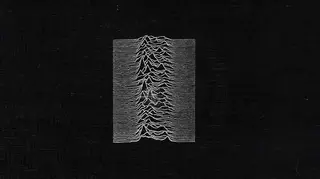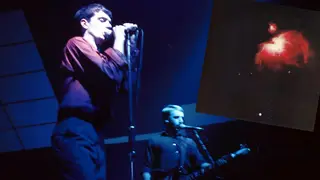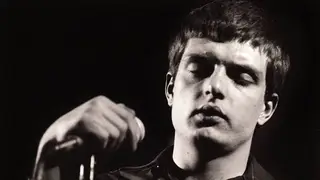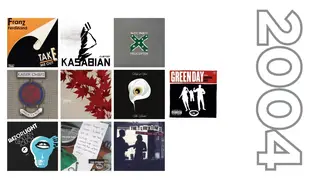How Love Will Tear Us Apart became Ian Curtis's memorial
18 May 2024, 13:00
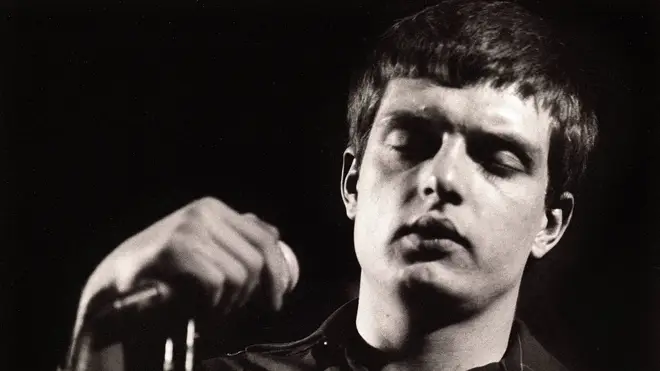
The legendary Joy Division song tells a genuine story of lost love and tragedy.
Trigger warning: this story contains content about suicide
Love Will Tear Us Apart was a tribute to a dying relationship, a haunted singer and a legendary band, expressing the bewildered feeling that “something so good… just can’t function no more”,
Joy Division singer Ian Curtis took his own life on 18th May 1980 and the song was released as a single the month after. It was a horribly appropriate tribute to the 23-year-old and the career of the Manchester band, which was frozen in time at that point. He would have been 65 years old on 15 July 2021, had he lived.

Joy Division - Love Will Tear Us Apart [OFFICIAL MUSIC VIDEO]
Built around a hypnotic Peter Hook bassline that mirrors a silvery synthesiser riff played by Bernard Sumner, the song is full of desperation and resentment, sadness and loss. The song is completed with a frenetic drum track from Stephen Morris.
And it came from the heart: Joy Division singer Ian Curtis had married his girlfriend Deborah Woodruff in the summer of 1975, and the couple had a baby in April 1979, Natalie.
But there were problems on the horizon - Curtis had been diagnosed with epilepsy earlier that year and the stress of holding down a day job alongside his burgeoning career as a rock singer began to overwhelm him. Curtis and the rest of the band found themselves having to travel huge distances from their workplaces in the Greater Manchester area to perform shows up and down the country - often rushing back in the early hours of the morning.
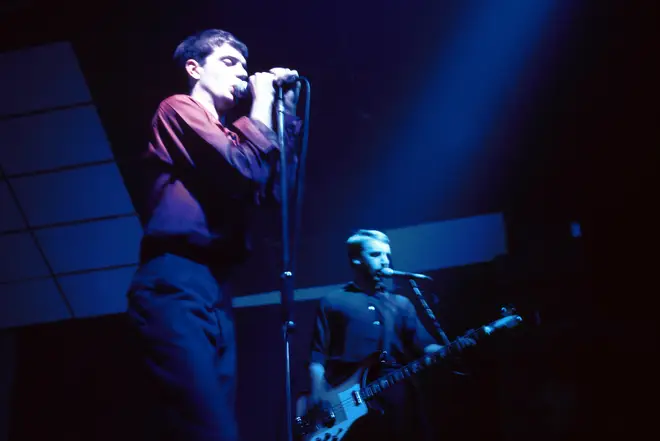
Written around August 1979 not long after the release of Joy Division's debut album Unknown Pleasures and, just as the band had started to gain critical acclaim and a "buzz" among music fans, Love Will Tear Us Apart presents a harrowing sketch of a relationship in trouble.
"And we're changing our ways, taking different roads
Then love, love will tear us apart... again."

Joy Division - Love Will Tear Us Apart (Peel Sessions 1979)
Ian’s problems only worsened when he met Belgian music promoter Annik Honoré at a Joy Division gig in October. The two began a long distance relationship, which caused more anguish between Curtis and his wife.
Love Will Tear Us Apart first came to the wider public’s attention with a John Peel session recorded in November, but it swiftly became a live favourite, being performed on Joy Division’s support slot with the Buzzcocks when they toured the UK that autumn.
However, for a song that appeared so fully formed, it was something of a struggle to get the thing down on vinyl.
Initial sessions took place at Pennine Sound Studios in Oldham in January of 1980, but the take was thought unsatisfactory by some of the band and their management... but others thought it was fine.

Joy Division - Love will Tear Us Apart (Pennine version)
Another take - the one that would become famous as Joy Division’s first posthumous single - was started at Strawberry Studios in Stockport in the March of 1980 and then finished at Pink Floyd’s Britannia Row studios in London later that month.
The “single” version was slower and more graceful than the “Pennine” version - Factory Recods boss Tony Wilson later claimed that he’d given Curtis a copy of Frank Sinatra’s 20 Golden Greats so the singer could study how to croon.
Discussions went on as to which version was the better take - so Factory Records released both: the Strawberry version on the A-side, the Pennine version on the flip, next to the official B-side These Days.

Wilson and JD manager Rob Gretton sniffed the makings of a hit, so they did a very UN-Factory Records thing and commissioned a promo video. This was shot on 28th April 1980 at the run down TJ Davidson’s rehearsal rooms in Manchester, where Joy Division had worked up most of their famous songs.
The band performed live over a backing track, causing some horrible sync issues, but the sound was later altered and is one of the few professionally-shot pieces of Joy Division footage.
It was all in vain, though - when the song made Number 13 in the charts in the aftermath of Curtis’s death, chart show Top Of The Pops had been temporarily taken off the air by a strike. It apparently had at least one airing on TV in the band's native North West.

None of this prevented Love Will Tear Us Apart from becoming an indie classic. The single re-entered the charts in 1983, thanks to a cover version by pop star Paul Young, plus renewed interest in the group after the success of New Order's Blue Monday.
After many years of avoiding playing Joy Division songs, New Order now regularly perform the song as an encore in their live shows, including their headline set at Glastonbury's Other Stage in 2016.

New Order - Love Will Tear Us Apart HD (Glastonbury , Worthy Farm, Pilton, England, 25.06.16.)
If you or anyone you know has been affected by this story, you can get help with mental health here
Samaritans
Confidential support for people experiencing feelings of distress or despair.Phone: 116 123(free 24-hour helpline)Website: www.samaritans.org
CALM
The Campaign Against Living Miserably (CALM) is leading a movement against suicide. Every week 125 people in the UK take their own lives. And 75% of all UK suicides are male. CALM exists to change this.Phone: 0800 58 58 58(daily, 5pm to midnight)Website: www.thecalmzone.net
Papyrus
Are you, or is a young person you know, not coping with life? For confidential suicide prevention advice contact HOPELINEUK.Phone – 0800 068 4141Monday to Friday, 10am to 10pm, and 2pm to 10pm on weekends and bank holidaysWebsite: www.papyrus-uk.org
There are more useful links at Radio X's Mental Health Help page here and we've also teamed up with the Campaign Against Living Miserably (CALM), to bring you a series of podcasts with advice and real stories about mental health


